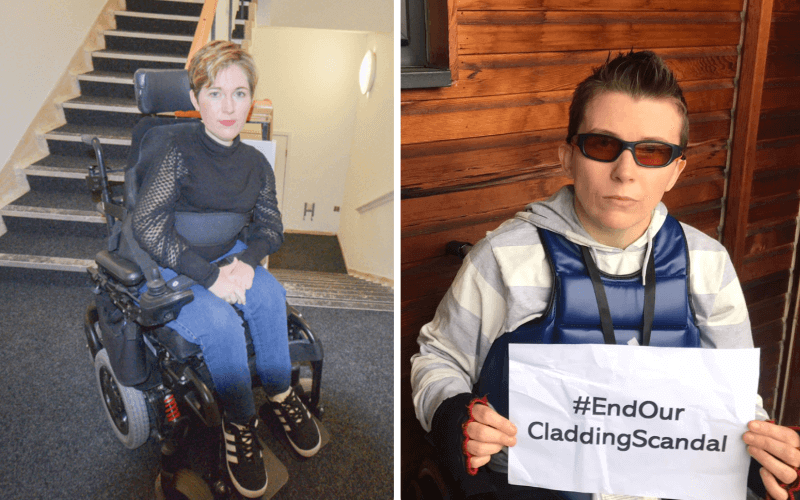Two campaigners have won permission from the high court to challenge the government’s refusal to ensure that all disabled people can safely evacuate from high-rise blocks of flats in emergencies.
Georgie Hulme and Sarah Rennie, co-founders of the disabled-led leaseholder action group Claddag and both of them wheelchair-users who live in high-rise buildings, have been told they can apply for a judicial review of the decision made by former home secretary Priti Patel.
Patel rejected the Grenfell Tower Inquiry’s recommendation that all owners and managers of high-rise residential buildings should be forced to prepare a personal emergency evacuation plan (PEEP) for all residents who might find it difficult to “self-evacuate”.
That rejection – on the grounds of “practicality”, “proportionality” and “safety” – came despite a promise from prime minister Boris Johnson that he would implement all the recommendations from the inquiry’s first phase.
Hulme and Rennie have now been granted permission to seek a judicial review of the decision and have been told they have an “arguable” case.
It is hoped the court will hear their legal challenge by the end of the year.
The judge who heard their application has also agreed to cap their costs, so if they lose their case they will have to pay a maximum of £20,000 towards Home Office costs, as well as court fees that are likely to be no more than £1,500.
Claddag has so far raised nearly £16,000 through a crowdfunding appeal, but still needs to raise about another £5,500 to continue with the case.
Claddag’s solicitors, Bhatt Murphy, are working on a “no win no fee” basis, and if Rennie and Hulme are successful with their case, all the unused donations will be returned.
Hulme told Disability News Service yesterday (Wednesday): “Whilst the permission for a hearing is great news, the fact that the government needs to be held to account in this way is sadly another example of how it considers disabled, deaf and older people’s lives as less worthy.
“We appreciate the devastating impacts of both the cost of living and the building safety crises, but any small donation will help us, as a community, to get our day in court.”
The government’s rejection of the PEEPs recommendation came even though those who responded to a consultation on the proposal overwhelmingly supported their introduction.
The Home Office is now consulting on its own “alternative package” of measures, which it calls Emergency Evacuation Information Sharing, which does not go as far as PEEPs and will only apply to the minority of buildings that have been assessed as being “at higher risk”.
The Grenfell fire led to 72 people losing their lives, including 15 of Grenfell’s 37 disabled residents, on the night of 14 June 2017.
It followed years of failure to plan for how disabled people living in Grenfell would evacuate if they needed to.
Rennie and Hulme believe the Home Office decision to reject the PEEPs proposal breaches its duty to protect life, and its duty not to discriminate against disabled people, under the European Convention on Human Rights, as well as the government’s public sector equality duty under the Equality Act.
They also believe the consultation process on the PEEPs proposal was unfair because the Home Office later held follow-up meetings with representatives of local authorities and housing associations, allowing them to raise concerns to which Claddag and others had no chance to respond.
Hulme and Rennie also argue that the Home Office failed to understand the inquiry’s reasons for recommending the PEEPs proposal.
The Home Office said it would not be appropriate to comment on ongoing legal proceedings.
Picture: Sarah Rennie (left) and Georgie Hulme

 This is an existential crisis for disabled people, says campaigner after climate change court win
This is an existential crisis for disabled people, says campaigner after climate change court win MPs are told accessible housing is at breaking point… and they are partly to blame
MPs are told accessible housing is at breaking point… and they are partly to blame Court set to be told how DWP misrepresented plans to reform ‘fitness for work’ test
Court set to be told how DWP misrepresented plans to reform ‘fitness for work’ test